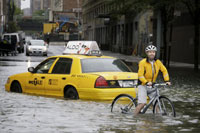 This week we posted that the Pacific nation of Kiribati is considering purchasing land on Fiji as a possible site to relocate as rising waters threaten to submerge their home islands. As distant and exotic as Kiribati’s problem may sound an article in the New York Times brings it all a bit closer to home. Whereas roughly 100,000 residents of Kiribati are threatened by rising water, “about 3.7 million Americans live within a few feet of high tide and risk being hit by more frequent coastal flooding in coming decades because of the sea level rise caused by global warming, according to new research.” One scientist referred to it as an “invisible tsunami.”
This week we posted that the Pacific nation of Kiribati is considering purchasing land on Fiji as a possible site to relocate as rising waters threaten to submerge their home islands. As distant and exotic as Kiribati’s problem may sound an article in the New York Times brings it all a bit closer to home. Whereas roughly 100,000 residents of Kiribati are threatened by rising water, “about 3.7 million Americans live within a few feet of high tide and risk being hit by more frequent coastal flooding in coming decades because of the sea level rise caused by global warming, according to new research.” One scientist referred to it as an “invisible tsunami.”
Rising Sea Levels Seen as Threat to Coastal U.S.
If the pace of the rise accelerates as much as expected, researchers found, coastal flooding at levels that were once exceedingly rare could become an every-few-years occurrence by the middle of this century.
By far the most vulnerable state is Florida, the new analysis found, with roughly half of the nation’s at-risk population living near the coast on the porous, low-lying limestone shelf that constitutes much of that state. But Louisiana, California, New York and New Jersey are also particularly vulnerable, researchers found, and virtually the entire American coastline is at some degree of risk.
“Sea level rise is like an invisible tsunami, building force while we do almost nothing,” said Benjamin H. Strauss, an author, with other scientists, of two new papers outlining the research. “We have a closing window of time to prevent the worst by preparing for higher seas.”

I’ve been wondering about coastal flooding for a few years and always wondered what NASA is going to do about it when Florida’s coast is flooded, if NASA is still around down there?
If anyone paid attention to the news over the winter, its flooding in Thailand, the Philippines, and several other countries.
New Study Lowers Estimate of Ancient Sea-Level Rise
ScienceDaily (Mar. 14, 2012) — The seas are creeping higher as the planet warms, but scientists have not yet reached a consensus about how high they may go. Projections for the year 2100 range from inches to several feet, or more. http://www.sciencedaily.com/releases/2012/03/120314142835.htm
After Galveston’s(Texas) great storm in 1900, they began building a seawall; they’d been talking about it for a long time. Maybe these areas that are at risk today should quit talking talking & start building.